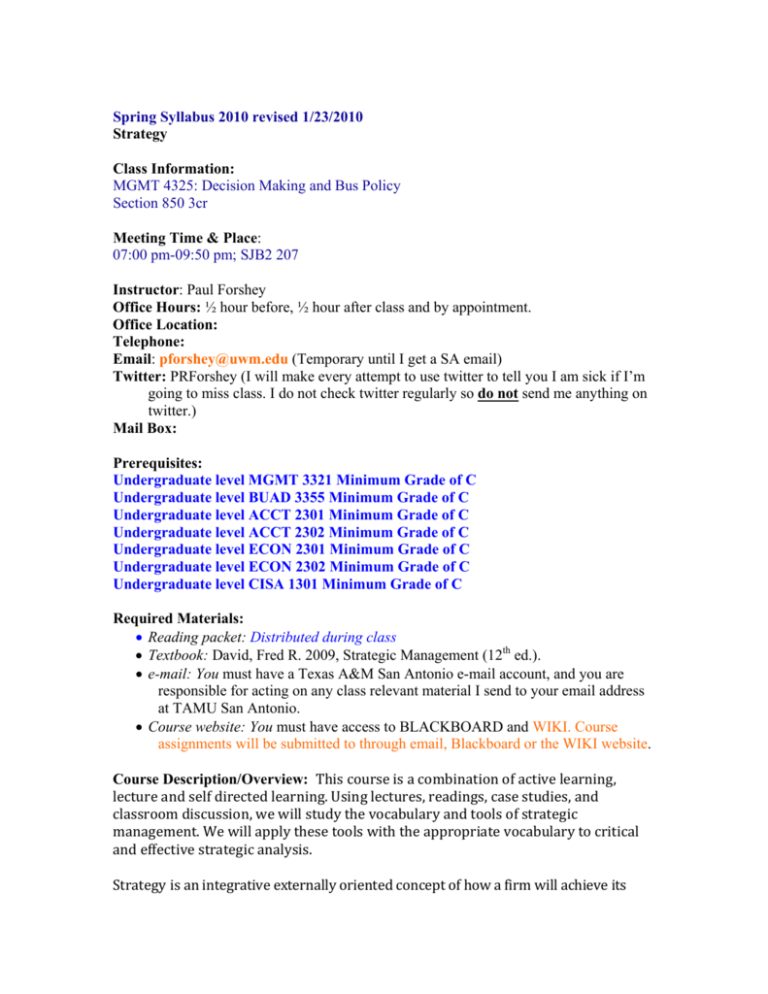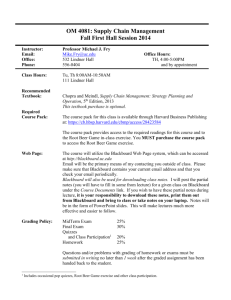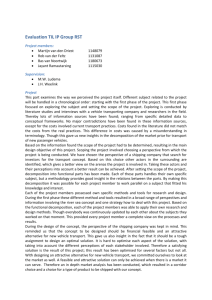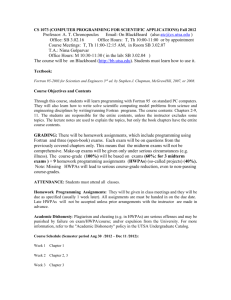Organizational Behavior - MGMT4325-890
advertisement

Spring Syllabus 2010 revised 1/23/2010 Strategy Class Information: MGMT 4325: Decision Making and Bus Policy Section 850 3cr Meeting Time & Place: 07:00 pm-09:50 pm; SJB2 207 Instructor: Paul Forshey Office Hours: ½ hour before, ½ hour after class and by appointment. Office Location: Telephone: Email: pforshey@uwm.edu (Temporary until I get a SA email) Twitter: PRForshey (I will make every attempt to use twitter to tell you I am sick if I’m going to miss class. I do not check twitter regularly so do not send me anything on twitter.) Mail Box: Prerequisites: Undergraduate level MGMT 3321 Minimum Grade of C Undergraduate level BUAD 3355 Minimum Grade of C Undergraduate level ACCT 2301 Minimum Grade of C Undergraduate level ACCT 2302 Minimum Grade of C Undergraduate level ECON 2301 Minimum Grade of C Undergraduate level ECON 2302 Minimum Grade of C Undergraduate level CISA 1301 Minimum Grade of C Required Materials: • Reading packet: Distributed during class • Textbook: David, Fred R. 2009, Strategic Management (12th ed.). • e-mail: You must have a Texas A&M San Antonio e-mail account, and you are responsible for acting on any class relevant material I send to your email address at TAMU San Antonio. • Course website: You must have access to BLACKBOARD and WIKI. Course assignments will be submitted to through email, Blackboard or the WIKI website. Course Description/Overview: This course is a combination of active learning, lecture and self directed learning. Using lectures, readings, case studies, and classroom discussion, we will study the vocabulary and tools of strategic management. We will apply these tools with the appropriate vocabulary to critical and effective strategic analysis. Strategy is an integrative externally oriented concept of how a firm will achieve its objectives. A strategy encompasses the pattern of organizational actions taken to create and capture value and to obtain advantage over competitors. Effective strategic management requires integration of the knowledge and skills you acquired in accounting, finance, marketing, operations, organizational behavior, and information systems management to develop the "big picture" view required of managers, regardless of industry or current employment position. We will spend time analyzing the feasibility of broad-based, long-term strategies used by various companies to obtain competitive advantage. Some of the questions we will examine are: • Why do some companies perform better than their rivals? • Are some industries more profitable or growth oriented than others? • Why do firms enter certain product markets? • Why do firms acquire other firms? Course Objectives: If you attend class regularly, read the assignments, prepare detailed case analyses, and actively participate in class discussions, you will be able to: • Understand the major strategic management concepts, theories, and models and how to apply those to appropriate business situations. • Appropriately apply concepts and techniques learned in your major courses and in this course to perform in-depth analysis and evaluation of complex company situations. • Constructed recommendations and arguments to support proposed alternative strategic actions for a company based on the concepts learned. Evaluation Class Participation SSA: Exam I: Exam II: Exam III: 10% 15% (Group Project) 25% (multiple choice) 25% (Essay) 25% (multiple choice) Using these weights, final scores (out of 100) will be converted into letter grades as follows: A+ 93-100; A- 90-92 B+ 87-89; B 83-86; B-80-82 C+ 77-79; C 73-76; C- 70-72 D+ 67-69; D 63-66; D- 60-62 F below 60 Participation: This is an active learning class. The material contained in the readings is mostly factual in nature. You must transform and apply this information. Sharing your opinion and expertise with other members of the class provides you with valuable feedback about your understanding of the material. Preparation before class is very important. You must read and analyze the material carefully in order to make valuable contributions to class discussion. More importantly, you will most likely need the ability to analyze complex situations, develop solutions, and present those solutions to coworkers in a positive way if you are to excel in your chosen career. This kind of class preparation allows you to further develop the skills necessary to develop and present ideas to peers in a relatively safe environment. What is effective participation? • Did you attend class (attendance will be taken each class)? • Do you willingly participate regularly and frequently? • Do you willingly interact with your colleagues and the instructor? • Can you answer questions about the situation and readings that reflect an understanding of the material? • Are your points relevant to the situation? • Do your points clarify our understanding of the situation? • Do your comments clarify and build on the important aspects of previous comments and lead to a clear statement of the concepts being covered? • Are you willing to test, consider and accept new ideas? • Do you treat your colleagues in a respectful manner? • Do you listen during class or do you finish other home work, text friends or read during class? Please note that my grading of class participation is somewhat subjective. I will use the criteria above to develop your grade. Attendance of all the classes and submission of all the work on time is expected, and thus is an average grade (75-85%). Exemplary performance (85% and up) is perfect attendance and clearly insightful contributions. Attendance: If you have some emergency that prohibits you from attending a class, please try to notify me prior to class by e-mail. Exams: To pass this class, you must complete 3 exams on the scheduled dates. There are three Exams scheduled on the syllabus that consist of multiple choice or essay answers. Make-up Exams: Absence from an exam will only be approved for the following reasons (documentation is required and prior notice is expected): • Participation in an authorized University activity. • Confinement due to illness, under a doctor's care with a doctor's note. • Death in the immediate family. • Participation in legal proceedings that require your presence. • Documented military participation. It is your responsibility to supply me with appropriate documentation demonstrating the validity of your excuse and to request a second exam. If you fail to take the exam on the scheduled date or are unable to demonstrate an approved reason for absence, you will receive a score of zero (0) for the exam. I do consider reasonable requests to take an exam early. Reasonable requests for exams in the past have involved unexpected travel for work or the military. Should you have a conflict in your schedule that would result in a zero on the exam, request an early exam at least 2 weeks prior to the exam so a time can be arranged. Exam Appeals: I occasionally make mistakes. If you wish to appeal an exam grade, write a brief memo stating specific reasons why you believe a grading error has occurred, attach a copy (never your original) of your exam. For multiple choice questions, find the location in the book that supports your answer. You must submit appeals to me within one week of the exams being returned to the class. I will consider your appeal and either regrade the exam or explain why your grade will stand. I will regrade exams within 10 days. Exam grades are final one week after the exams have been returned or upon return of a regraded exam. Quizzes: Any one of the in-class situations may be a quiz. Should I choose to administer a quiz each quiz will count toward 5% of your final exam. Student Strategic Analysis group project: You will identify a company in the process of some strategic move and use the tools provided in the text to analyze the move. You need to present your opinion of the potential success of this strategic move. You will receive complete instructions during the class. Late work: subtract 10% points from the grade received for each day after the assignment is due down to 50%. Computers and cell phones: this is an interactive class that requires your full attention and participation. As a courtesy to the instructor and your fellow students please turn off or silence your cell phone during class time. If you must have it on for emergencies, make sure you turn off the sound (ringer) and leave the class room to take the call. Computers are not required during class time and should used only to take notes. Unnecessary disruptions from cell phones, text messaging on phones or computers will negatively impact your participation grade. Schedule Class 1: Thursday, January 21 Class introduction Introduction to Strategy Create Groups Reading Required: Chapter 1 p. 1-29 Assignments: Blackboard: WIKI: Case: Library Retrieval: Class 2 Thursday, January 28 Reading Required: Chapter 2 Assignments: 1. Bring written answers to questions 4, 5, 14 and 15 (p27) to class. Find an online news article about the how the Federal Government has already or may regulate the banking industry in response to current banking. 2. Be prepared to discuss how political or regulatory changes may affect the banking industries strategic plans. 3. Be prepared to discuss the relationship between the personal ethics of banking executives and their business ethics (question 17 p 27) applied the banking collapse. Blackboard WIKI: Case: Library Retrieval: Class 3 Thursday, February 4 Reading Required: Chapter 3; Disney Case 30- 43 Assignments: 1. Go online and find any item you can put on a EFE matrix for Disney and bring it to class. (Keep All Disney information you create. You will need it) 2. Be prepared to discuss Issues for Review and Discussion question 2 in class. Bring in your findings from week 2 about banking and find an additional article that affects banking in either an economic, social or technological area. 3. Be prepared to use Porter’s five forces model to evaluate competiveness within the US banking industry. Blackboard: WIKI: Case: Library Retrieval: Class 4 Thursday, February 11 Reading Required: Chapter 4 Assignments: 1. Be prepared to do experiential exercise 4a and 4b in class. a. (Keep All Disney information you create. You will need it) 2. I will make time for exam questions and review. Blackboard: WIKI: Case: Library Retrieval: Class 5 Thursday, February 18 Exam I: Chapters 1- 4(Multiple Choice) Reading Required: Part 5 (p. 320) How to prepare a case analysis. Assignments: 1. Using all the information you have collected about Disney be prepared to work on steps 1 through 7 (p. 325). 2. Group Project Assignment 1 is due Blackboard: WIKI: Case: Library Retrieval: Class 6 Thursday, February 25 Reading Required: Chapter 6 (Yes it is Chapter 6) Assignments: Using all the information you have collected about Disney be prepared to work on step 8 (p. 325). You need to be prepared to do a SWAT analysis and at least one other analysis. Blackboard: WIKI: Case: Library Retrieval: Class 7 Thursday, March 4 Reading Required: Chapter 5 Assignments: Using all the information you have collected about Disney be prepared to work on steps 9-12 (p. 325). Blackboard: WIKI: Case: Library Retrieval: Class 8 Thursday, March 11 Reading Required: Wal*Mart case Assignments: Be prepared to start a strategic analysis of Wal*Mart using the information provided to you in the case. Collect information from the case to start working through the strategic analysis steps 1-12 (p. 325) in class. Blackboard: WIKI: Case: Wal*Mart: Library Retrieval: Spring Break March 15-20 Class 9 Thursday, March 25 Reading Required: Chapter 7 Assignments: 1. Basic Company information for you project is due 2. Be prepared to discuss how well Wal*Marts structure matches its strategy in class. 3. Be prepared to discuss how well Disney’s structure matches its strategy in class. 4. How do the two structures differ and why? Blackboard: WIKI: Case: In class Wal*Mart Video Library Retrieval: Class 10 Thursday, April 1) Reading Required Wal*Mart 2005 Assignments: 1. Be prepared to answer how Wal*Marts Competitors have changed? 2. Have they stayed the low cost provider? 3. How has Wal*Mart’s environment changed? 4. From and internal perspective, has Wal*Mart changed? Blackboard: Wal*Mart’s current financials WIKI: Case: Wal*Mart 2005 Library Retrieval: Class 11 Thursday, April 8 Reading Required: Newell Case Assignments: 1. Identify information in the Newell case you can use for a strategic analysis. 2. Come prepared to do a strategic analysis on Newell Blackboard: WIKI: Case: Newell Company Library Retrieval: Class 12 Thursday, April 15 Reading Required: Assignments: 1. I will leave time for exam questions. 2. Be prepared to explain the outcome of Rubbermaid’s strategic actions from Rubbermaid’s perspective, Newell’s perspective and Wal*Mart’s perspective. Blackboard: WIKI: Case: Library Retrieval: Class 13 Thursday, April 22: Exam II (Essay Exam: strategic analysis) Reading Required: Assignments: Rough draft of the project is due Blackboard: WIKI: Case: Library Retrieval: Class 14 Thursday, April 29: Corporate Governance Reading Required: Chapter 8: Assignments: 1. Experiential Exercise 8a 2. Experiential Exercise 8d Blackboard: WIKI: Case: Accounting Fraud at WorldCom Library Retrieval: Class 15 Thursday, May 6: Class Presentations of Projects Reading Required: Assignments: Blackboard: WIKI: Case: Library Retrieval: Class 16 Thursday, May 8: Reading Required: Chapter 9 Assignments: 1. I will make time for questions and a test review 2. Finish all in class cases Blackboard: WIKI: Case: Library Retrieval: May 12-13 no classes Finals Week: Exam III (in class exam) to be scheduled.




